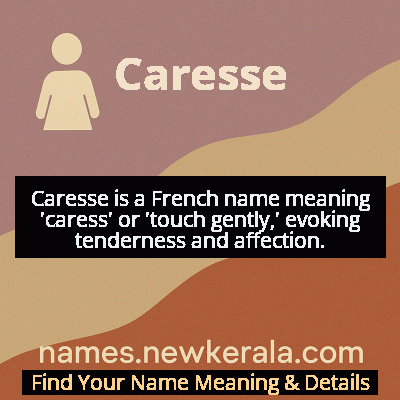Caresse Name Meaning & Details
Origin, Popularity, Numerology Analysis & Name Meaning of Caresse
Discover the origin, meaning, and cultural significance of the name CARESSE. Delve into its historical roots and explore the lasting impact it has had on communities and traditions.
Name
Caresse
Gender
Female
Origin
French
Lucky Number
7
Meaning of the Name - Caresse
Caresse is a French name meaning 'caress' or 'touch gently,' evoking tenderness and affection.
Caresse - Complete Numerology Analysis
Your Numerology Number
Based on Pythagorean Numerology System
Ruling Planet
Neptune (Ketu)
Positive Nature
Intuitive, analytical, spiritual, and inquisitive.
Negative Traits
Secretive, reserved, aloof, and can be overly critical.
Lucky Colours
Green, yellow.
Lucky Days
Monday.
Lucky Stones
Cat’s eye, moonstone.
Harmony Numbers
1, 5, 6.
Best Suited Professions
Scientists, researchers, spiritual leaders, detectives.
What People Like About You
Depth of knowledge, analytical skills, spirituality.
Famous People Named Caresse
Caresse Crosby
Publisher and Socialite
Founded Black Sun Press and patented the modern backless brassiere
Caresse Norman
Actress
Noted for work in experimental cinema and independent theater
Caresse Henry
Fashion Designer
Pioneered sustainable luxury fashion with ethical production methods
Name Variations & International Equivalents
Click on blue names to explore their detailed meanings. Gray names with will be available soon.
Cultural & Historical Significance
The name embodies the French concept of 'douceur de vivre' (sweetness of life) and represents a sophisticated approach to naming that prioritizes emotional resonance over traditional family or religious associations. In contemporary French culture, Caresse maintains its connection to artistic and literary circles, often chosen by parents who value creativity, emotional intelligence, and subtle sophistication. The name's enduring appeal lies in its ability to convey deep emotional meaning while maintaining an air of refined elegance, making it a timeless choice that bridges historical French romanticism with modern sensibilities about emotional expression and personal identity.
Extended Personality Analysis
Individuals named Caresse are typically perceived as gentle, empathetic, and emotionally intelligent. They often possess a natural ability to comfort others and create harmonious environments through their soothing presence and intuitive understanding of emotional needs. Their name's meaning tends to influence their interpersonal style, making them particularly skilled at building deep, meaningful connections through subtle gestures and thoughtful attention.
Caresse-named individuals usually exhibit artistic sensibilities and creative expression, often drawn to fields that allow them to explore beauty, emotion, and human connection. They tend to be diplomatic communicators who avoid confrontation, preferring to resolve conflicts through understanding and compromise. While sometimes perceived as reserved, they possess strong inner strength and resilience, particularly when defending those they care about or principles they value deeply. Their combination of sensitivity and quiet determination makes them effective in roles requiring both emotional intelligence and steadfast commitment, from counseling and teaching to artistic creation and community leadership.
Modern Usage & Popularity
Caresse remains a relatively rare but cherished name in contemporary times, maintaining its French elegance while appealing to parents seeking unique yet meaningful names. In France, it ranks outside the top 500 names but enjoys steady usage among families valuing literary and artistic connections. Internationally, the name has seen increased interest since the 2010s, particularly in English-speaking countries where French names are considered sophisticated and romantic. Modern parents often choose Caresse for its gentle sound, positive meaning, and distinction from more common names. The name appears more frequently in creative communities, with many parents in artistic, literary, or academic circles selecting it for its cultural resonance and emotional depth. While not trending dramatically upward, Caresse maintains a consistent presence as a 'hidden gem' name that appeals to those seeking something both beautiful and meaningful without being overly common or trendy.
Symbolic & Spiritual Meanings
Symbolically, Caresse represents the power of gentle touch and emotional connection in human relationships. The name evokes images of soft breezes, delicate fabrics, and tender moments, serving as a metaphor for the subtle yet profound ways we affect one another. In literary and artistic contexts, Caresse often symbolizes the transformative power of kindness and the importance of emotional sensitivity in a harsh world. The name carries connotations of healing, comfort, and the quiet strength found in compassion. It represents the idea that small, gentle actions can have significant impact, much like how a single caress can communicate more than words. This symbolism extends to concepts of nurturing, protection, and the creation of safe emotional spaces where vulnerability can flourish and genuine connection can occur, making the name a powerful emblem of human tenderness and emotional intelligence.

